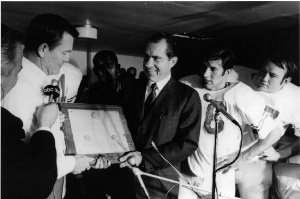| No. 8: Royal Flush
The 1969 season marked the 100th anniversary of college football. In a stroke of programming genius, ABC persuaded Texas and Arkansas to play the final game of the regular season, moving their usual October date to the first weekend in December. Legend has it that ABC's Roone Arledge had to promise Arkansas that President Richard Nixon would attend and that the network would also televise Arkansas' 1970 season opener.
The Longhorns were the top-ranked team in the country and had an 18 game winning streak. The Razorbacks were ranked number two and had won 15 straight. Texas game into the game with the nation's top defense and Arkansas boasted the top defense.
 |
|
Richard Nixon hands DKR the 1969 national championsip trophy as James Street looks on. |
The Horns started off badly, losing a fumble on the second play from scrimmage. Things got progressively worse as Texas turned the ball over six times in the first three quarters and found themselves trailing 14-0 entering the final period.
But as fate would have it, those three quarters of futility only served to set the stage for one of the most dramatic comebacks in college football history.
Texas QB James Street opened the fourth quarter by scrambling for a touchdown. Head Coach Darrell Royal, realizing he was up against a great team in a hostile environment, had decided before the game to roll the dice and go for two after the Longhorn's first touchdown. His first gamble paid off as Street ran it into the end zone to cut the Razorbacks lead to 14-8.
Arkansas came roaring back and drove the ball 73 yards to the Texas 7 yard line. On third-and-goal Razorback Head Coach Frank Broyles decided it was his turn to spin the wheel of chance. Instead of settling for a field goal, the Hogs went for the touchdown.
Arkansas QB Bill Montgomery's throw to the end zone was picked off by Danny Lester. The Hogs' first turnover of the day proved to be fatal, as three points would have most likely put the game out of Texas' reach.
Texas drove the ball out to its own 43 yard line, where the drive appeared to stall. Facing fourth-and-3 with just under five minutes remaining, Royal made one of the gutsiest calls of all time.
As he told the Orange County Register in a 2004 interview, "We had been confused with their defensive (scheme) all day. I just felt it was time to gamble."
"Right 53 Veer pass," Royal instructed Street. The play, a deep pattern throw to the tight end, wasn't in the Texas game plan package.
Tight end Randy Peschel recalls feeling panicked when he looked back and saw the ball.
The play went for 44 yards as Peschel was brought down at the Arkansas 13. Jim Bertelsen ran it in two plays later and the game was tied at 14. Third string QB Donnie Wigginton, who was also the holder, made a big save on a high snap and Happy Feller's point-after kick put Texas up for good, 15-14, with 3:58 left.
After the game, President Nixon proclaimed the Longhorns as the National Champions, despite the fact that Penn State was also undefeated. This caused Texas radio personality Cactus Pryor to quip, "President Nixon just proclaimed Texas No. 1 and the state of Pennsylvania Democrat."
Penn State Head Coach Joe Paterno took this slight personally. In a 2003 interview, more than 30 years after the fact, he said, "How could President Nixon know so much about college football in 1969, and so little about Watergate in 1973?"
In reality, Paterno has no room to complain. His Nittany Lions were invited to play Texas in the Cotton Bowl on New Year's Day of 1970. Penn State declined the invitation, choosing instead to play Missouri in the Orange Bowl. While their stated reason for opting to go to Miami was the "warm climate", the hunch is it had less to do with the weather and more to do with the Longhorns' triple option.
Texas beat Notre Dame in the Cotton Bowl to become the consensus national champion for 1969. However, it took more last minute heroics by Street to turn back the Irish. The Longhorns' winning streak eventually reached 30 games and included a share of the 1970 national title as well.
As stirring and memorable as Texas' comeback was, that is not the only reason it is a significant event in Texas sports history. There are two other factors which set this game apart.
First, it is estimated that 58 million U.S. households had television sets at that time. 50 million viewers, approximately one in every four Americans, watched the telecast of this game. That puts it on a very short list of sporting events that can lay claim to such staggering numbers.
The game also marked the end of a troubling era in Longhorn football. While no true Texas fan is proud of this legacy, the fact remains that the 1969 Texas Longhorns were the last all-white team to win the sport's national championship.
Those close to the program believe Royal had nothing to do with Texas' reluctance to integrate. In fact, his players said he was intolerant of racial slurs. The decision about whether or not to recruit black players was not his to make. "Football coaches," Royal was once quoted as saying, "don't decide when you integrate."
However, the following season ushered in new age in Texas football. Julius Whittier, a sophomore linebacker, made the varsity and went on to become Texas' first black letterman.
In an ironic twist of poetic justice, when the Longhorns claimed their next consensus national title 35 years later, it was a black quarterback that led back to the summit.
|